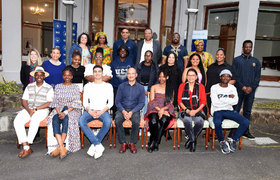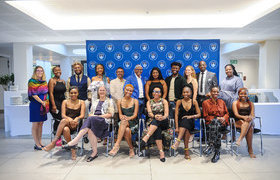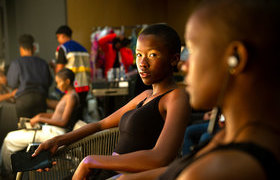Meet Hlamulo Khorommbi – the newly elected president of UCT’s SRC
27 November 2023 | Story Niémah Davids. Photos Robin Thuynsma. Read time 7 min.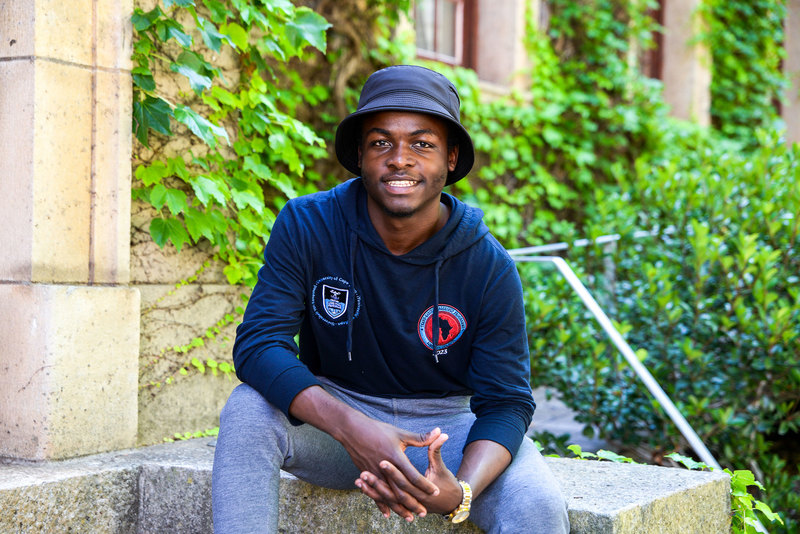
As the newly elected president of the University of Cape Town’s (UCT) Students’ Representative Council (SRC), Hlamulo Khorommbi has reaffirmed his commitment to serving UCT’s diverse student community – the university’s largest constituency. Prioritising their mental health and well-being, ensuring improved support for international students, and leading from the front are high priorities.
Khorommbi’s term officially started on 1 November and he understands the enormity of the task that rests squarely on his shoulders. But he’s not alone. With a strong, committed and supportive team, he is ready to give the job his all, make meaningful change, and leave a legacy that will serve as a foundation for those who will come after him.
“Being elected as president of the UCT SRC is a great honour and an enormous responsibility. It indicates that my fellow students trust me enough to represent and lead them, and to advocate in their best interest. I see this as an opportunity to drive positive change and to contribute towards creating a more inclusive education system,” he said.
Khorommbi spoke to UCT News about his plans for his 2023/2024 term.
Niémah Davids (ND): The university community is quickly getting to know you as the SRC president. Let us in on a few things some may not yet know.
Hlamulo Khorommbi (HK): That’s probably the easiest question I’ll need to answer today then. I’m a third-year physiotherapy student in the Faculty of Health Sciences. I was born and raised in the vibrant village of Tshidzini in Limpopo by my grandmother – my hero and my everything. My upbringing in this community has instilled in me my passion for community development and respect for my roots.
“I’m a curious being and satisfy that curiosity by always asking questions.”
I consider myself very easy-going. I love meeting new people from diverse backgrounds and getting their perspectives on various local and global matters and learning from them. I’m a curious being and satisfy that curiosity by always asking questions.
Beyond this, I’m also an avid reader and find great solace and enlightenment on the pages of a good book. I love sport because I believe that physical activity is important for the well-being of the human mind and body, and it also teaches us so much about teamwork.
ND: How would you define your leadership style?
HK: I’m an inclusive, disciplined leader. I believe that everyone on the team has something meaningful to contribute and should be given the platform to do so. I lead from the front, but I also don’t mind being in the background to allow the team to take the lead; that is necessary to build trust and cohesion.
ND: What are you most looking forward to about your term?
HK: There’s a simple answer to that question. Together with my team, we are looking forward to effecting positive change within the institution that our fellow students will benefit from – not only now, but in the long term as well.
ND: What are some of the priorities you’d like to address during your tenure.
HK: There are a few things on the list. To start, student mental health is a huge problem. As students, we have so much to contend with: a heavy academic load, challenges at home and so much more. We need more support. We need to ensure that Student Wellness Service is adequately equipped to support the needs of all students. This is very important.
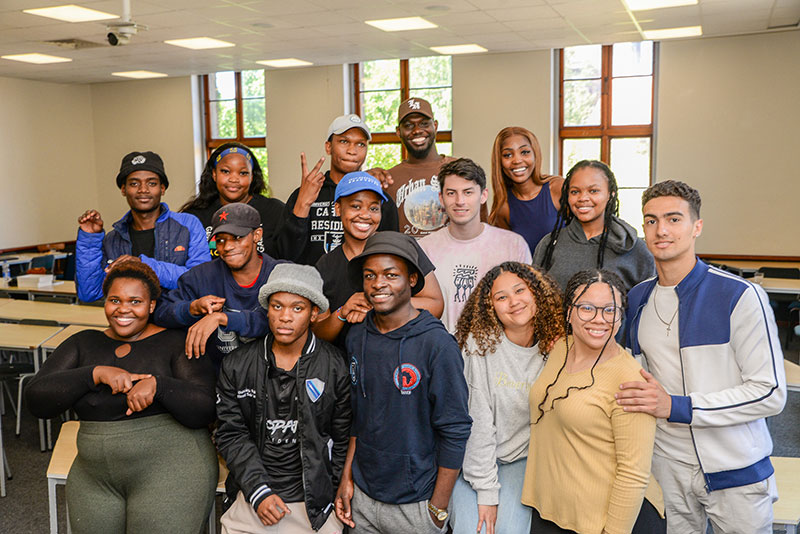
Similarly, international students face endless hassles. To alleviate their burdens, we need to ensure that they are granted longer registration periods to get all their documents together. Currently, the time frames they are provided are too short and it causes unnecessary stress and anxiety, and in many cases, students are prevented from registering. So, we need to streamline this process.
It’s also of utmost importance that we work with the university leadership to ensure that all academically eligible students are not excluded based on their financial circumstances. There’s a lot of work to do around this issue and it’s one thing I am very passionate about changing – it’s necessary for transformation.
ND: Yes, you’ve only just begun, but what challenges do you foresee on the horizon?
HK: The issue of housing has and continues to be a challenge for our students, and it will be no different at the start of 2024. We need to work towards making more provisions for students who need to live on campus – the supply should exceed the demand, or we will always sit with this problem.
“We can make a difference together.”
I also suspect that the issues around fee blocks and financial exclusion will crop up again next year. So, making work of amicable solutions that will suit all parties is necessary to avoid any hindrances come the new year.
ND: What’s necessary to achieve the goals you’ve set out?
HK: Advocacy, strategic planning and collaboration are key. We plan to work closely with our stakeholders so that they can help us fulfil our mandate and achieve our goals. Great power lies in collaboration and mobilisation, and we’ll use it to help us reach our objectives but not before we get students to acknowledge that these goals will benefit them. They must get behind our goals first.
ND: What other neglected areas do you feel need attention and focus this year?
HK: Surprisingly, fundraising is a neglected area that we plan to focus on in 2023/2024. It will help to generate much-needed funds and drive important initiatives. We shouldn’t underestimate its value and what it can bring.
ND: As you embark on this huge undertaking, what is the one thing you won’t lose sight of and will always encourage your team to remember?
HK: We can make a difference and together we can shape a future where our voices are heard and where they matter. UCT students are counting on us.
 This work is licensed under a Creative Commons Attribution-NoDerivatives 4.0 International License.
This work is licensed under a Creative Commons Attribution-NoDerivatives 4.0 International License.
Please view the republishing articles page for more information.







